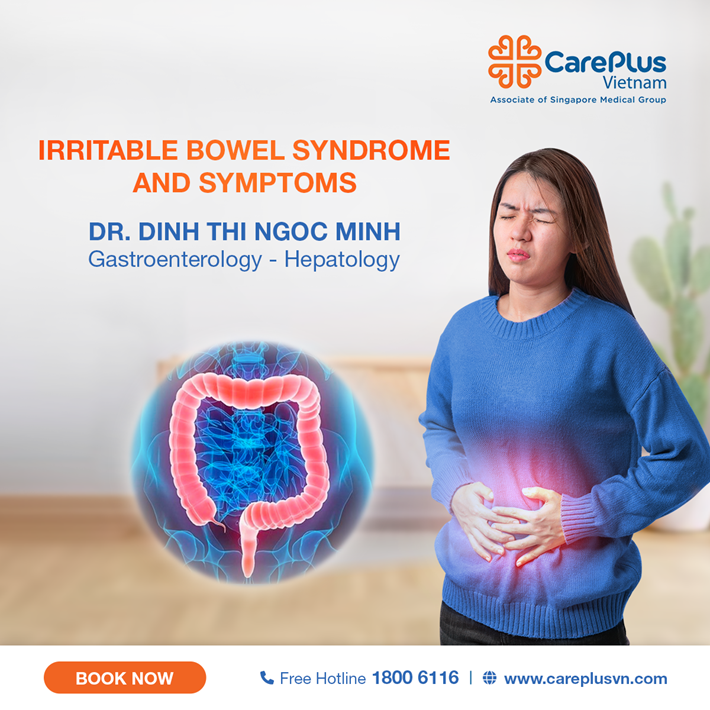IRRITABLE BOWEL SYNDROME (IBS) AND SYMPTOMS
With symptoms such as abdominal cramps and changes in bowel habits (diarrhea, loose stools, constipation, feeling of incomplete evacuation after bowel movement), patients are often diagnosed with Irritable Bowel Syndrome (IBS). So, what is IBS?

3/1/2024 2:26:57 PM
One of the primary reasons people seek medical attention at Gastroenterology departments is due to experiencing symptoms such as abdominal cramping or disruptions in bowel habits (diarrhea, loose stools, mushy stools, or constipation, feeling of incomplete evacuation after bowel movement). After undergoing necessary tests, patients are often diagnosed with Irritable Bowel Syndrome (IBS). So, what is IBS?
1/ IRRITABLE BOWEL SYNDROME (IBS)
Irritable bowel syndrome is a chronic disorder affecting the digestive tract. IBS is highly prevalent, with Ministry of Health statistics showing a significant incidence rate, affecting 10-15% of the global population. In Vietnam, it's estimated that over 14 million people suffer from IBS, yet only 30% of them seek medical attention.
2/ CAUSES
Currently, the precise cause of irritable bowel syndrome remains unclear, but several hypotheses have been researched and supported by the scientific community, including:
- Abnormal colonic and small bowel spasms (commonly known as "spastic colon"). Colonic spasms cause abdominal cramps in patients, so sometimes doctors need to prescribe antispasmodic medications and increase fiber intake to alleviate symptoms. However, not all IBS patients experience bowel spasms.
- Anxiety and stress: Numerous studies indicate that stress impacts the gut-brain axis and disrupts the balance of gut bacteria. Therefore, most individuals with irritable bowel syndrome experience exacerbated symptoms such as abdominal pain, bloating, flatulence, and diarrhea during stressful periods.
- Food sensitivities or intolerances: Many IBS patients exhibit symptoms of intolerance to certain foods, often experiencing bowel movements after consuming them. Some foods that may exacerbate IBS symptoms include dairy products (containing lactose), legumes (white beans, red beans,...), and certain vegetables (broccoli, cauliflower, cabbage,...). These foods increase gas production in the intestines and cause spasms. This hypothesis is also being validated, so when encountering such conditions, it is advisable to consult with a doctor regarding appropriate dietary adjustments rather than excessively restricting intake and causing nutrient deficiencies.
- Increased gut sensitivity: Recent studies have shown that the gut nerves of people with IBS are more sensitive than normal, so even a small amount of gas or mild spasms can cause pain for the patient.
- In some cases, IBS appears following severe gastrointestinal infections (e.g., Salmonella, Campylobacter bacterial infections, or viral infections). However, this hypothesis hasn't been specifically explained in terms of underlying mechanisms, and most IBS patients do not have a history of previous gastrointestinal infections.
3/ SYMPTOMS
Irritable bowel syndrome is more common among young people and is more prevalent in women than in men. The most common symptoms of IBS include a combination of abdominal pain and changes in bowel habits.
- Abdominal pain: Patients often experience intermittent cramping abdominal pain. Some IBS sufferers find that pain intensity increases during periods of stress or after eating, and decreases after defecation. Some female patients notice that the pain is related to their menstrual cycle.
- Changes in bowel habits: Diarrhea or constipation frequently occur. Some patients exhibit alternating symptoms of constipation and diarrhea.
4/ DIAGNOSIS
Many other gastrointestinal disorders present with symptoms similar to irritable bowel syndrome. Therefore, IBS is a diagnosis made after excluding other conditions such as malabsorption syndrome, inflammatory bowel disease, and celiac disease.
During the examination, the doctor will make a diagnosis based on various tests and may request a colonoscopy for patients over 40, patients with a family history of colorectal cancer, or patients with alarming symptoms.
Irritable bowel syndrome is a benign condition, yet it significantly impacts patients' quality of life. If you experience issues with bowel habits, abdominal cramping, or any symptoms of IBS, please consult a doctor immediately.
Doctors at CarePlus will conduct examinations, diagnose, develop appropriate treatment plans, and prevent complications or other gastrointestinal disorders (e.g., colorectal cancer)